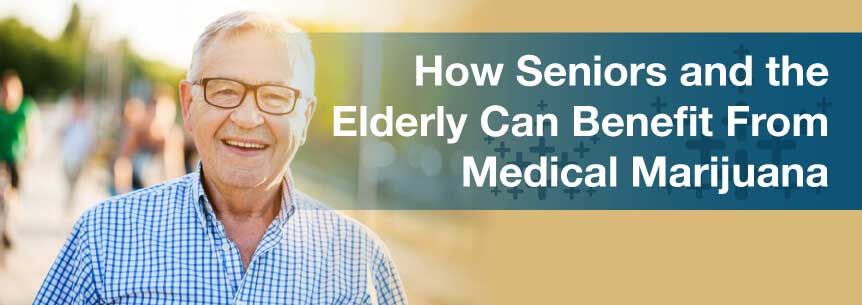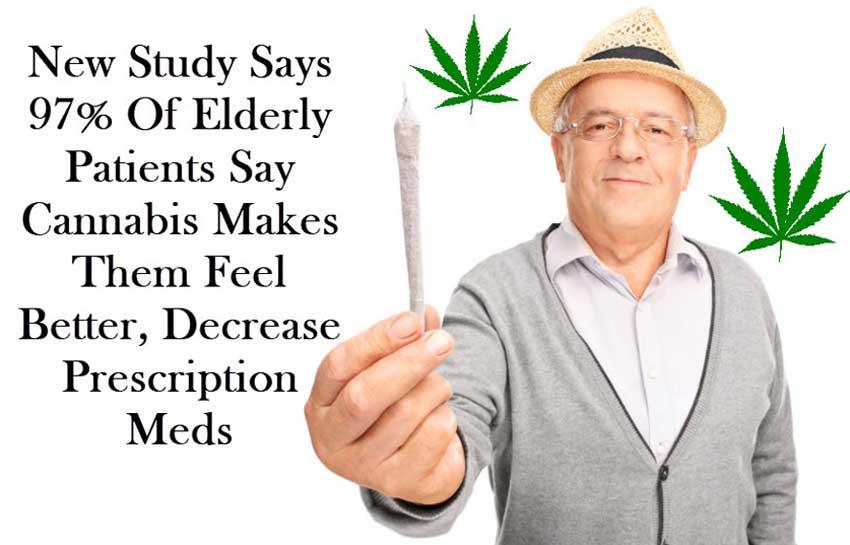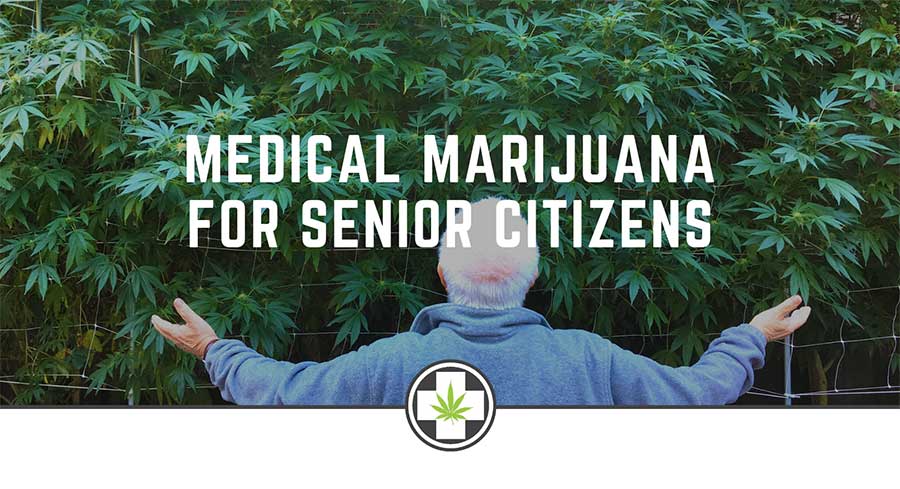Anti Aging Clinic | What Seniors Should Know About Medical Marijuana

Almost all seniors have experienced some sort of pain in their later years. Medical marijuana can help with that. What’s interesting is that you often don’t need to ingest the marijuana to reap the medical benefits of the plant.

Medical marijuana, whether it’s smoked, consumed, or applied through a topical treatment, can help relieve acute and chronic pain by attacking the already-present cannabinoid receptors in our body. It helps relieve pain from: Joint pain (like arthritis), Nerve damage, Chronic illness (like, glaucoma, MS, Parkinson’s).
In the U.S., people age 65 and older are among the fastest-growing group of cannabis users. To date, 33 states and the District of Columbia have legalized medical marijuana. Ten states also have legalized recreational use. That’s caused some experts to be concerned about older adults who may self-treat medical problems without guidance.[1]
How Medical Marijuana Works
“The goal with medical marijuana is to find the dose that gives a therapeutic benefit without a high, or slowing reaction time or causing sedation.” Diana Claudette Martins-Welch states. Dr. Martins-Welch is a physician in the division of geriatric and palliative medicine at Northwell Health, in Great Neck, N.Y. She continues to state, “To find that right dose, we start low and go slow.”
HOW MUCH DOES MEDICAL MARIJUANA COST?
The biggest complaint the researchers heard about medical marijuana was the cost. “It’s an out-of-pocket expense. Insurance doesn’t cover it because it’s federally illegal. The costs of medical marijuana vary widely, depending on the product a patient requires and where they purchase it. Many states also have different taxation policies that may pass some of the financial burden for cultivation and sales onto customers. While costs can be prohibitive, there are some programs available in certain states and municipalities to help low-income medical marijuana patients. Non-profit organizations and individual dispensaries may also be able to provide discount programs.

WHAT ARE THE BENEFITS OF MMJ?
Marijuana has been shown to have benefits in treating many different conditions that can befall seniors, including the following:
Cancer. Marijuana has been shown to alleviate the pain associated with some cancers as well as the nausea associated with chemotherapy and other treatments.
Chronic pain. Marijuana has been shown to alleviate pain in cases where pharmaceutical interventions offer diminishing returns in pain management.
Multiple sclerosis, such as late-onset MS, manifests pain, muscle spasms and urinary problems, all of which can be better managed through medical marijuana.
Glaucoma patients attest to marijuana’s ability to reduce inner-eye pressure.
Arthritis. Because of its powerful immune-modulation and anti-inflammatory properties, medical cannabis can play a role in both the symptom management and treatment of arthritis.
Alzheimer’s disease. The Journal of Alzheimer’s Disease published a preclinical study which found that a small amount of Tetrahydrocannabinol (THC), a chemical found in cannabis, can slow the production of beta-amyloid proteins, believed to be a signature characteristic and major contributor to the progression of Alzheimer’s.
Heart disease. When combined with exercise, good sleep and a healthy diet, cannabis can help prevent heart disease by reducing anxiety and helping patients deal with stress. Marijuana is also helpful for managing pain for patients suffering conditions such as angina.
Diabetes. Substantial research indicates that medical marijuana may prevent and treat diabetes by lowering insulin resistance, relieving pain and combating both oxidative stress and inflammation.
Fibromyalgia. While the primary trait of Fibromyalgia is unexplained and often debilitating pain, the illness can also produce symptoms of fatigue, poor sleep, depression and irritable bowel syndrome (IBS). Cannabis can offer a broad-spectrum relief by helping patients get better sleep, manage pain, improve mood and even address gastrointestinal issues like IBS.
Osteoarthritis. the most common type of arthritis affecting seniors, occurs when the cartilage between joints wears down so that the bones rub against each other. This can take its toll on the body in many ways, causing pain, stiffness, tenderness, loss of flexibility, bone spurs, and swelling.
NEGATIVE EFFECTS ESPECIALLY TO SENIORS
Memory loss, notably verbal and short term-memory loss. For seniors with any manifestations of this, related to the onset of dementia, the loss of memory associated with marijuana intake may in fact be indistinguishable, and thus confuse diagnosis.
Hallucinations (occasionally associated with some stronger strains of marijuana) may be wrongly interpreted by those who may already feel some effects of the onset of dementia.
Mental health. Marijuana has been shown to exacerbate or even instigate some mental illnesses such as psychosis and schizophrenia. There might also be a connection to bipolar disorder and depression.
Increased risk of falling is also noted as an effect of marijuana use that can be potentially catastrophic for some.
Overeating can certainly be detrimental to seniors who may already be overweight.
Respiratory problems. Regularly smoking marijuana can induce coughing and phlegm accumulation. Those who already have lung problems may find these exacerbated by marijuana use.[2]
RISKS OF MEDICAL MARIJUANA TO SENIORS
Medicinal cannabis can cause unwanted side effects, such as:
- Problems concentrating
- Dizziness and drowsiness
- Unsteadiness, fatigue and sedation
- Feelings of euphoria
- Vertigo, nausea and vomiting
- Depression
- Confusion
- Appetite (increase or decrease)
- Hallucinations
- Paranoid delusions
- Dry mouth
- Psychosis
- Cognitive distortion (having untrue thoughts)
- Convulsions
MMJ FOR SENIOR CITIZENS FAQ
1. IS MARIJUANA THE BEST TREATMENT FOR GLAUCOMA OR ARE THE TRADITIONAL MEDS FAR SUPERIOR AT THIS POINT?
Traditional medications are well-established for the treatment of glaucoma. It is important that you determine a target intraocular pressure with your ophthalmologist and then be followed closely. First line therapy is typically pharmacologic or laser therapy (not surgery). If pharmacologic therapy is chosen one current recommendation is topical prostaglandin. Consider marijuana to be a complimentary or supplemental therapy to your medication. This decision should be arrived upon with the guidance of your ophthalmologist. Cannabis does decrease intraocular pressure, and it also has neuroprotective properties. Therefor it may be helpful in the treatment and prevention of progression in glaucoma.
2. WHAT CONDITIONS QUALIFY FOR MEDICAL MARIJUANA?
There are a number of conditions that qualify for medical marijuana that can help seniors. They include but are not limited to:
- Amyotrophic lateral sclerosis
- Anxiety
- Cancer
- Chronic pain, dysmenorrhea (menstrual cramps)
- Glaucoma
- Inflammatory bowel disease including Crohn’s disease
- Intractable skeletal spasticity (muscle rigidity caused by diseases like multiple sclerosis and cerebral palsy)
- Migrains
- Muscular dystrophy
- Opioid use disorder
- Positive status for HIV or AIDS
- Post-Traumatic Stress Disorder (PTSD)
- Seizure disorder including epilepsy
- Terminal illness with prognosis of less than 12 months to live
- Tourette syndrome.
3. HOW CAN SENIORS USE MARIJUANA WITHOUT GETTING HIGH?
The compounds in marijuana that affect the body are THC and CBD. THC is responsible for the “high” associated with marijuana, while CBD, on the other hand, is responsible for marijuana’s anti-anxiety effects. Many seniors desire the symptom control without a “high.” They do not want any impact on their thinking, so it’s advisable to start with the lowest possible dose of THC.
4. IS MEDICAL MARIJUANA SAFE FOR SENIORS?
By 2020, the Substance Abuse and Mental Health Administration (SAMHSA) predicts that more than 4.4 million seniors will report prescription drug abuse. Even when not abused and taken as prescribed, many drugs harbor life-threatening side effects, especially in senior patients. Opiates can lower a patient’s resilience, and increase the risk of falls and confusion.
Medical marijuana is incredibly safe. When used correctly and with proper guidance, many of the risks of opiate use are greatly reduced. In addition, the risk of fatal overdose is completely negated.[3]
5. HOW DO SENIORS PREFER TO TAKE CBD?
Oral Delivery
CBD is best delivered in fatty foods and drinks like smoothies, acai bowls, and butter. These can be delicious and convenient ways to get your CBD, despite the absorption drawbacks. Coffee is another great way to deliver CBD. Furthermore, there are reports that CBD may help offset any caffeine jitters. These reports however are not yet yet fully understood. The best way to deliver CBD orally is to buy a potent product to start, take it with a fatty diet, monitor results and adjust from there.
Inhalation
Strictly speaking, vaping or smoking CBD is one of the most efficient ways to deliver whole-body effects of the chemical. However, this may seem unhealthy. It is true that inhalation of combustibles comes with adverse effects, but inhalation also skips the digestive tract and the liver, where the resulting dose of CBD can be modified.
Transdermal
CBD topicals (salves, creams, lotions, and patches) are very discreet and effective for localized aches and pains. This includes arthritis and other conditions. Studies have shown CBD to be well-absorbed topically, particularly in animal studies. But, those opting for this delivery method should make sure to massage the product thoroughly into the skin.[4]
6. WHAT IS CBD?
CBD stands for cannabidiol. It is the second most prevalent of the active ingredients of cannabis (marijuana). While CBD is an essential component of medical marijuana, it is derived directly from the hemp plant. Hemp plants are cousins to marijuana plant. While CBD is a component of marijuana (one of hundreds), by itself it is not psychoactive. This does means it does not cause a “high.” According to a report from the World Health Organization, “In humans, CBD exhibits no effects indicative of any abuse or dependence potential. To date, there is no evidence of public health related problems associated with the use of pure CBD.”

Things To Do In Miami, United States
Miami United States, News
